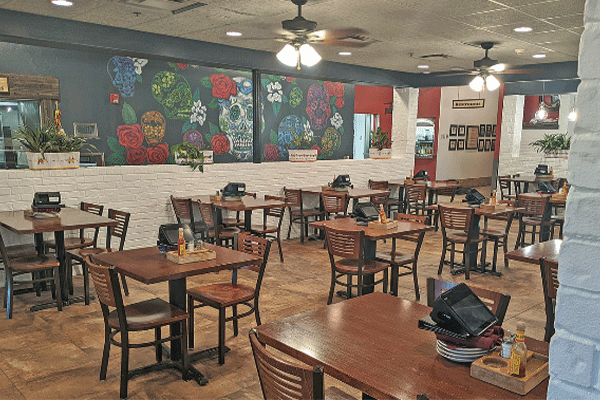OKLAHOMA CITY - The COVID-19 pandemic coupled with the drastic downturn in the energy sector has had expansive negative economic effects in Oklahoma.
Respondents to an Oklahoma Main Street Center survey “reported a significant loss in sales from a year ago,” the organization announced. Restaurants had a 66% decrease in sales, and retailers reported a 70% decline.
David Foxx, chief operations officer of Ted’s Café Escondido, is among those coping with the economic crisis. Ted’s has 10 locations in Lawton, Oklahoma City and Tulsa.
“Our dining rooms are at half capacity,” Foxx said Tuesday. “Our rental agreements were for a certain number of customers. But I don’t foresee us going back to full capacity anytime soon.”
Because of the coronavirus, one modification of his business model is reliance on curbside service.
Another major issue is the sharp decline in large events, such as weddings, Foxx said. Catering is “over $3 million of my business.”
Pre-pandemic, to-go orders “accounted for about 13% of our business,” he said. “We’re doing about 27% now, although it was over 30% when we reopened.” Foxx said he uses major third-party food delivery services such as Grubhub and DoorDash.
The company is “not making any money, but we’re not losing any, either,” he said.
Breakeven is “better than a lot of restaurants in this state are doing. A lot of people won’t be able to reopen.”
Prior to the statewide shutdown in mid-March the company had 1,052 employees, Foxx said. Today the payroll is approximately 700.
“We haven’t had to lay anybody off,” he said. Instead, “We immediately cut all non- essential services and have not had to bring all of those services back.”
Since the restaurants don’t have as much foot traffic, “We maybe get the carpet cleaned every three weeks instead of more frequently.” Also, with sales off 30% “we’re generating less trash,” so the waste collection bill is lower.
Ironically, unemployment benefits are contributing to Foxx’s economic headaches.
“We’re trying to fill 133 positions, but I can’t hire people right now,” he said Tuesday.
For example, “I have a young high-school girl who’ll be a senior this fall. She works 20 to 25 hours a week and earns about $12 an hour.” She qualifies for the additional $600 federal coronavirus stimulus check.
“Normally she makes $240 to $250 a week, but now she’s getting $750 a week,” Foxx said. “So she’s living at home with her parents and not working. And she’s no exception. There’s just no incentive right now.”
Larry Kudlow, director of the U.S. National Economic Council, had the same complaint.
Sunday, on CNN’s State of the Union program, Kudlow said the $600 checks which are being sent to Americans on unemployment as part of coronavirus relief efforts, and which are expected to end July 31, are a “disincentive” for people to return to work.
“The $600 plus-up that’s above the state unemployment benefits they will continue to receive is in effect a disincentive,” Kudlow said “I mean, we’re paying people not to work. It’s better than their salaries would get.”
Ted’s Café Escondido employs “a lot of high-school and college kids,” Foxx said.
After the March 15 shutdown, “We offered everybody their positions back,” he said. Less than 50% accepted. “Even if we could open back up to full capacity, I couldn’t,” Foxx said. “I don’t have enough people.”
The severe slump in the energy sector is a double-edged sword, he noted. “If you’re paying $2.50 a gallon for gas at the station, the oil/gas sector is surviving. If you’re paying less than that, there are a lot of job cuts.”
According to a recent Rystad Energy analysis of the latest U.S. Bureau of Labor Statistics data, more than 100,000 jobs in the nation’s energy sector have been lost.
Per-gallon prices Tuesday in the Oklahoma City metro ranged from $1.59 to $1.79, GasBuddy reported. Prices ranged from $1.60 to $1.66 per gallon in Lawton-Fort Sill; in Frederick and Grandfield, $1.69; Walters, $1.71; Hobart, $1.84; Altus, $1.78 to $1.99 per gallon; and Duncan, $1.79 to $2.09 a gallon, according to GasBuddy reports.
The Oklahoma Main Street Center conducted a survey of businesses in its 30 Main Street programs to determine what percent of losses were suffered as a result of the pandemic and closure of nonessential businesses. Data was gathered May 13-19 and resulted in 155 responses from 17 communities.
The survey asked respondents for the length of time their businesses could remain open if the disruption from COVID-19 were to continue. The result was one of optimism, with nearly 75% of survey respondents saying they would expect six or more months. More than 40% of respondents said they do not expect to go out of business.
“This crisis is causing all small businesses to look at their practices,” said Brent Kisling, executive director of the Oklahoma Department of Commerce.


